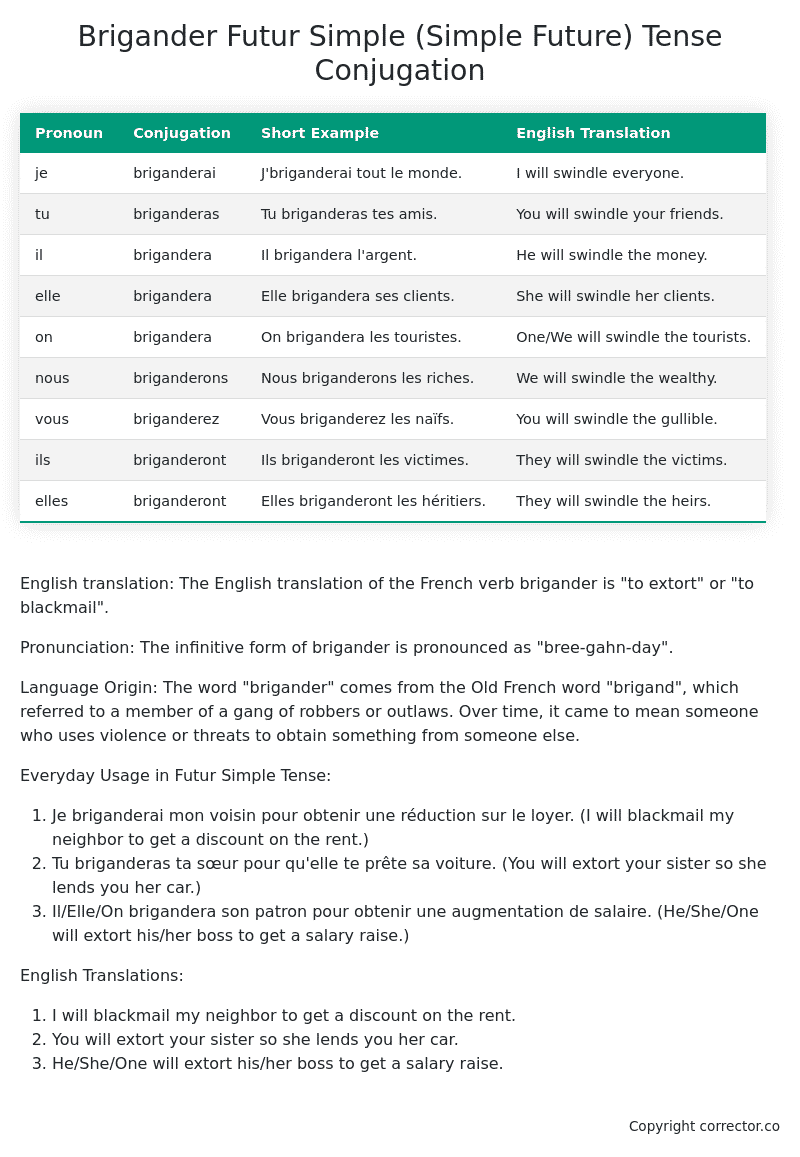Futur Simple (Simple Future) Tense Conjugation of the French Verb brigander
Introduction to the verb brigander
English translation:
The English translation of the French verb brigander is “to extort” or “to blackmail”.
Pronunciation:
The infinitive form of brigander is pronounced as “bree-gahn-day”.
Language Origin:
The word “brigander” comes from the Old French word “brigand”, which referred to a member of a gang of robbers or outlaws. Over time, it came to mean someone who uses violence or threats to obtain something from someone else.
Everyday Usage in Futur Simple Tense:
- Je briganderai mon voisin pour obtenir une réduction sur le loyer. (I will blackmail my neighbor to get a discount on the rent.)
- Tu briganderas ta sœur pour qu’elle te prête sa voiture. (You will extort your sister so she lends you her car.)
- Il/Elle/On brigandera son patron pour obtenir une augmentation de salaire. (He/She/One will extort his/her boss to get a salary raise.)
English Translations:
- I will blackmail my neighbor to get a discount on the rent.
- You will extort your sister so she lends you her car.
- He/She/One will extort his/her boss to get a salary raise.
Table of the Futur Simple (Simple Future) Tense Conjugation of brigander
| Pronoun | Conjugation | Short Example | English Translation |
|---|---|---|---|
| je | briganderai | J’briganderai tout le monde. | I will swindle everyone. |
| tu | briganderas | Tu briganderas tes amis. | You will swindle your friends. |
| il | brigandera | Il brigandera l’argent. | He will swindle the money. |
| elle | brigandera | Elle brigandera ses clients. | She will swindle her clients. |
| on | brigandera | On brigandera les touristes. | One/We will swindle the tourists. |
| nous | briganderons | Nous briganderons les riches. | We will swindle the wealthy. |
| vous | briganderez | Vous briganderez les naïfs. | You will swindle the gullible. |
| ils | briganderont | Ils briganderont les victimes. | They will swindle the victims. |
| elles | briganderont | Elles briganderont les héritiers. | They will swindle the heirs. |
Other Conjugations for Brigander.
Le Present (Present Tense) Conjugation of the French Verb brigander
Imparfait (Imperfect) Tense Conjugation of the French Verb brigander
Passé Simple (Simple Past) Tense Conjugation of the French Verb brigander
Passé Composé (Present Perfect) Tense Conjugation of the French Verb brigander
Futur Simple (Simple Future) Tense Conjugation of the French Verb brigander (this article)
Futur Proche (Near Future) Tense Conjugation of the French Verb brigander
Plus-que-parfait (Pluperfect) Tense Conjugation of the French Verb brigander
Passé Antérieur (Past Anterior) Tense Conjugation of the French Verb brigander
Futur Antérieur (Future Anterior) Tense Conjugation of the French Verb brigander
Subjonctif Présent (Subjunctive Present) Tense Conjugation of the French Verb brigander
Subjonctif Passé (Subjunctive Past) Tense Conjugation of the French Verb brigander
Subjonctif Imparfait (Subjunctive Imperfect) Tense Conjugation of the French Verb brigander
Subjonctif Plus-que-parfait (Subjunctive Pluperfect) Tense Conjugation of the French Verb brigander
Conditionnel Présent (Conditional Present) Tense Conjugation of the French Verb brigander
Conditionnel Passé (Conditional Past) Tense Conjugation of the French Verb brigander
L’impératif Présent (Imperative Present) Tense Conjugation of the French Verb brigander
L’infinitif Présent (Infinitive Present) Tense Conjugation of the French Verb brigander
Struggling with French verbs or the language in general? Why not use our free French Grammar Checker – no registration required!
Get a FREE Download Study Sheet of this Conjugation 🔥
Simply right click the image below, click “save image” and get your free reference for the brigander Futur Simple tense conjugation!

Brigander – About the French Futur Simple (Simple Future) Tense
Formation of Futur Simple
For regular -er verbs (e.g., parler – to speak)
For regular -ir verbs (e.g., finir – to finish)
For regular -re verbs (e.g., vendre – to sell)
Common Everyday Usage Patterns
Conditional Statements
Interactions with Other Tenses
Futur Antérieur
Conditional
Present
Summary
I hope you enjoyed this article on the verb brigander. Still in a learning mood? Check out another TOTALLY random French verb conjugation!


